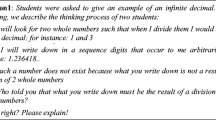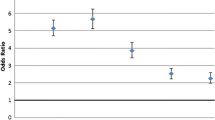Abstract
It has been assumed, on historical and psychological grounds, that the concept of irrational numbers faces two major intuitive obstacles: a) the difficulty to accept that two magnitudes (two line segments) may be incommensurable (no common unit may be found); and b) the difficulty to accept that the set of rational numbers, though everywhere dense, does not cover all the points in an interval: one has to consider also the more “rich” infinity of irrational points. In order to assess the presence and the effects of these obstacles, three groups of subjects were investigated: students in grades 9 and 10 and prospective teachers.
The results did not confirm these hypotheses. Many students are ignorant when asked to classify various numbers (rational, irrational, real) but only a small part of the subjects manifest genuine intuitive biases. It has been concluded that such erroneous intuitions (a common unit can always be found by indefinitely decreasing it and “in an interval it is impossible to have twodifferent infinite sets of points [or numbers]”) have not a primitive nature. They imply a certain intellectual development.
Similar content being viewed by others
References
Arcavi, A., Bruckheimer, M., and Ben-Zwi, R.: 1987, ‘History of mathematics for teachers’,For the Learning of Mathematics 7(2), 18–23.
Courant, R. and Robbins, H.: 1941/1978,What is Mathematics?, Oxford University Press, Oxford.
Fischbein, E.: 1975,The Intuitive Sources of Probabilistic Thinking in Children, D. Reidel, Dordrecht.
Fischbein, E.: 1987,Intuition in Science and Mathematics: An Educational Approach, D. Reidel, Dordrecht.
Fischbein, E., Tirosh, D., and Hess, P.: 1979, ‘The intuition of infinity’,Educational Studies in Mathematics 10, 30–40.
Author information
Authors and Affiliations
Rights and permissions
About this article
Cite this article
Fischbein, E., Jehiam, R. & Cohen, D. The concept of irrational numbers in high-school students and prospective teachers. Educ Stud Math 29, 29–44 (1995). https://doi.org/10.1007/BF01273899
Issue Date:
DOI: https://doi.org/10.1007/BF01273899




